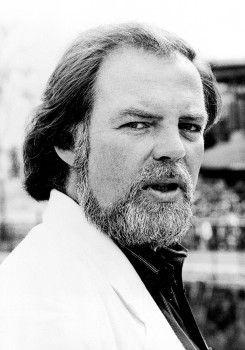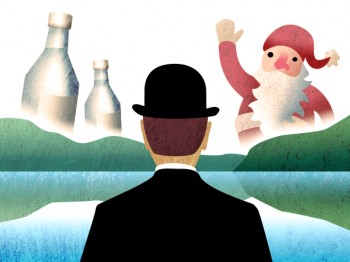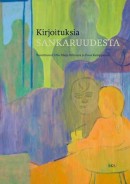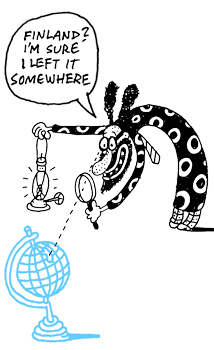Search results for "Peltonen"
New from the archives
11 May 2015 | This 'n' that

Juhani Peltonen. Photo: C-G Hagström / WSOY.
This week’s pick is, like last week’s, a period piece – this time a cry for help from the 1980s in the work of Juhani Peltonen (1941-1998).
Like Runar Schildt’s short story Raketen, written shortly before Finland gained independence from Russia and was almost immediately plunged into civil war, these pieces by the multitalented Juhani Peltonen, who wrote plays for stage and radio as well as short stories, novels and poems, were published shortly before major and irrevocable change.
In the short story ‘The Blinking Doll’, we are a year short of the fall of the Berlin Wall, and it seems as if things are never going to change. We follow two forty-year-old lawyers, Juutinen and Multikka, as they trudge along the beach in one of the charming resort towns of the west coast in which they have spent a couple of days dealing with a minor felony case.
They’re both forty, and divorced, disillusioned with their jobs and with the world; and both are infatuated with one of their colleagues, a woman whom they call ‘The Blinking Doll’.
There is, Peltonen says, a ‘pact of friendship and mutual assistance between the men’ – a jocular reference to the notorious treaty of 1948 in which Finland was obliged to resist attacks on the Soviet Union through its territory, and to ask for Soviet aid if necessary. In 1988, this seemed as if it were written in stone – and the men’s emotional lives are similarly petrified. They discuss their isolation, their lack of purpose, their inexplicable weeping fits. The most painful thing, says Multikka, is love; or, says Juutinen, and which comes to the same thing, the lack of it.
As Erkka Lehtola, our then Editor-in-Chief, remarks in his introduction, Peltonen – Finnish literature’s best-known comi-tragedian, he calls him – focuses on the difficulty of loving in a violent, mechanical, oppressed world. Is it the passage of twenty-five years that imbues his writing with such a poignant sense of stasis and futility? There is a sense of desperation, barely controlled. As one of his poems has it,
Too abundant in the course of the evening
Cries for help from the heart of stifled detail, legato.
![]()
The Books from Finland digitisation project continues, with a total of 388 articles and book extracts made available on our website so far. Each week, we bring a newly digitised text to your attention.
The almost nearly perfect travel book
4 April 2014 | Articles, Non-fiction

Illustration: Joonas Väänänen
The question of what foreign people think of us Finns, and Finland has always been a particularly burning one in these latitudes: a young nation, a small people. Can we be as good as bigger and wealthier nations? Tommi Uschanov reads a new book on the Nordic countries published in England, keeping a sharp eye on what is being said about…. Finland, naturally
When an article based on The Almost Nearly Perfect People: The Truth About the Nordic Miracle by Michael Booth was published last January in the London Guardian, there was a nationwide outcry in Finland. ‘Finland being bashed in the British media,’ one tabloid headlined grandiosely, while a sober financial paper spoke of ‘a broadside full of stinky stuff’. It takes a re-reading of the article after having read the book to understand why. To create an artificial atmosphere of controversy, the article is lop-sidedly critical of Finland in a way which the book goes out of its way to avoid.
The Almost Nearly Perfect People belongs in a by now time-honoured genre within English letters: the humorous encomium to a host culture by an expatriate – or immigrant, as we hosts impolitely insist on calling them. The only difference is that Michael Booth, a British food and travel writer, does not discuss only Denmark, where he has lived for a decade, but visits each of the other four Nordic countries in turn. More…
Fatherlands, mother tongues?
12 April 2013 | Letter from the Editors

Patron saint of translators: St Jerome (d. 420), translating the Bible into Latin. Pieter Coecke van Aelst, ca 1530. Walters Art Museum, Baltimore. Photo: Wikipedia
Finnish is spoken mostly in Finland, whereas English is spoken everywhere. A Finnish writer, however, doesn’t necessarily write in any of Finland’s three national languages (Finnish, Swedish and Sámi).
What is a Finnish book, then – and (something of particular interest to us here at the Books from Finland offices) is it the same thing as a book from Finland? Let’s take a look at a few examples of how languages – and fatherlands – fluctuate.
Hannu Rajaniemi has Finnish as his mother tongue, but has written two sci-fi novels in English, which were published in England. A Doctor in Physics specialising in string theory, Rajaniemi works at Edinburgh University and lives in Scotland. His books have been translated into Finnish; the second one, The Fractal Prince / Fraktaaliruhtinas (2012) was in March 2013 on fifth place on the list of the best-selling books in Finland. (Here, a sample from his first book, The Quantum Thief, 2011, Gollancz.)
Emmi Itäranta, a Finn who lives in Canterbury, England, published her first novel, Teemestarin tarina (‘The tea master’s book’, Teos, 2012), in Finland. She rewrote it in English and it will be published as Memory of Water in England, the United States and Australia (HarperCollins Voyager) in 2014. Translations into six other languages will follow. More…
Kirjoituksia sankaruudesta [Writings on heroism]
25 March 2011 | Mini reviews, Reviews
 Kirjoituksia sankaruudesta
Kirjoituksia sankaruudesta
[Writings on heroism]
Toim. [Ed. by] Ulla-Maija Peltonen & Ilona Kemppainen
Helsinki: Suomalaisen Kirjallisuuden Seura, 2010. 330 p., ill.
ISBN 978-952-222-207-7
€ 29, paperback
This book examines Finnish heroism and anti-heroism by using approaches from folklore studies, history and literary theory. Political ‘heroism’ manufactured by the media is explored through a study of in-depth personal portraits of Finnish politicians published in the country’s biggest newspaper, Helsingin Sanomat, between 1981 and 2005. According to the research material, a positive impression is made by a narrative about a politician who is an independent thinker even in the context of his own party, from an ordinary home, engaged in manual work in his youth and risen to success overcoming setbacks through his own merits and without intrigue. The story of the European Union’s Commissioner for Economic and Monetary Affairs, Olli Rehn, is a heroic story about a politician who dares believe in a European Finland even when it was disadvantageous to his career. Since the 1990s, writers have begun to take a renewed interest in war heroism; the climate in the 1960s and 1970s was pacifist, but now the ‘Winter War spirit’, which is deemed heroic, has been surfacing in an ever-increasing variety of situations, including economic crises.
Translated by Ruth Urbom
Archives open!
12 December 2014 | This 'n' that

Illustration: Hannu Konttinen
For 41 years, from 1967 to 2008, Books from Finland was a printed journal. In 1976, after a decade of existence as not much more than a pamphlet, it began to expand: with more editorial staff and more pages, hundreds of Finnish books and authors were featured in the following decades.
Those texts remain archive treasures.
In 1998 Books from Finland went online, partially: we set up a website of our own, offering a few samples of text from each printed issue. In January 2009 Books from Finland became an online journal in its entirety, now accessible to everyone.
We then decided that we would digitise material from the printed volumes of 1976 to 2008: samples of fiction and related interviews, reviews, and articles should become part of the new website.
The process took a couple of years – thank you, diligent Finnish Literature Exchange (FILI) interns (and Johanna Sillanpää) : Claire Saint-Germain, Bruna di Pastena, Merethe Kristiansen, Franziska Fiebig, Saara Wille and Claire Dickenson! – and now it’s time to start publishing the results. We’re going to do so volume by volume, going backwards.
The first to go online was the fiction published in 2008: among the authors are the poets Tomi Kontio and Rakel Liehu and prose writers Helvi Hämäläinen (1907–1998), Sirpa Kähkönen, Maritta Lintunen, Arne Nevanlinna, Hagar Olsson (1893–1979), Juhani Peltonen (1941–1998) and Mika Waltari (1908–1979).
To introduce these new texts, we will feature a box on our website, entitled New from the archives, where links will take you to the new material. The digitised texts work in the same way as the rest of the posts, using the website’s search engine (although for technical reasons we have been unable to include all the original pictures).
![]()
By the time we reach the year 1976, there will be texts by more than 400 fiction authors on our website. We are proud and delighted that the printed treasures of past decades – the best of the Finnish literature published over the period – will be available to all readers of Books from Finland.
The small world of Finnish fiction will be even more accessible to the great English-speaking universe. Read on!
